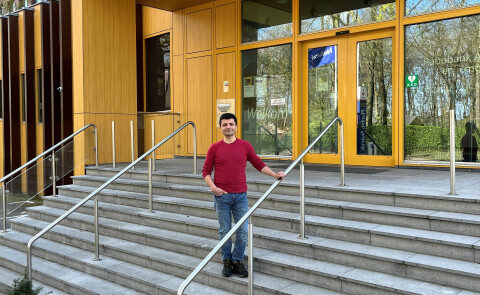
May 8th 2024
A second life in the Netherlands
- First-hand experiences
- Recruitment
- OF THE
Helping fifty people with a refugee background find a job within three years was Rabobank's ambition in April 2022. They achieved this goal in January 2024. As a partner of Refugee Talent Hub, Rabobank is serious about diversity and the promise that everyone has the same opportunities. Turkish Serdar Sahin is one of fifty professionals with a refugee background who work at Rabobank. Rabobank interviewed him about his second life in the Netherlands.
Please note: this article was translated using a translator appFive years ago, Serdar fled his native Turkey. Until then, he lived a happy life with his wife and three sons. Due to the political unrest after the coup in 2016, he had to leave hearth and home overnight. Due to his work as a financial investigator, he was seen as a threat to the state. Proof? There wasn't.
“Without explanation I was suddenly labeled 'terrorist', but that was not based on anything. That does something to you,” he says, audibly affected. “I had a successful job for eighteen years. I worked in several provinces in Turkey and with the UN Peacekeeping Force. My life as I knew it no longer existed. Everything I had built, and all my friends and family – I had to leave everything behind.” A difficult period began. Serdar said goodbye to his wife and children and left for Greece. He eventually ended up in the Netherlands.
Fall and rise
Missing his family was the hardest for him, but fortunately he can also laugh about other things that cost him. “I wasn't very good at cycling, but in a country with more bicycles than people, that's not very useful. When I stayed in Delfzijl, I started practicing a lot. That left me with a lot of bumps and scratches!”
Another thing he had to get used to: the landscape. “Moving from the mountains to a flat country with the highest point being 320 meters – that was quite crazy. And I won't talk about the weather... But I found the Dutch most difficult. Learning a new language at 45 is not easy.” Despite his struggle with that completely foreign language, his command of it is truly art.
Networks, networks, networks
Once in the Netherlands, Serdar wanted to make himself useful as quickly as possible. “Getting benefits didn't feel right to me. I wanted to work, to contribute something. In addition to the courses I took, I started looking for a job. Also into volunteer work. My language coach pointed me to a number of places where I could apply. I was accepted at The Food Bank. I worked there for about six months and I will never forget that place. Everyone was very friendly, I immediately felt at home.”
When his residence permit was obtained, he was given a home in The Hague. “My wife and children were still in Turkey. I missed that, but I tried to focus on improving my Dutch.” He started with a transition year in higher education at The Hague University of Applied Sciences. In the meantime, he also continued to apply for a permanent job. Serdar: “As a refugee it is difficult if no one knows you. This is where 'via-via' often gives you the best chance. So I had to start networking.
What I really like about the Netherlands are foundations. I have registered with several foundations. One of them was Guest at the Table. There you will be paired with a Dutch family who will help you get used to the Netherlands. That's how I met Martine, a single mother with two children. She told me that she had once worked for NATO in North Macedonia and, like me, in Kosovo. We started talking about our experiences and at one point I told her that I was looking for work. I found that difficult, I was ashamed of it, but I had to do something, because in the meantime I was becoming desperate from my unemployment. I have always worked since I was twenty and now I was left empty-handed. I went to school and volunteered, but also wanted to find a permanent job.”
Everything in Dutch please
Martine's brother-in-law knew someone at Rabobank. “She had passed on my details and I received a call from Sander Aandeweg, team leader at FEC, Financial Economic Crime. We had a nice informal conversation and I was allowed to come for an interview. I was very enthusiastic. After all my applications, I was finally allowed to come for an interview. I had one chance. It was now or never!”
Because it was his first official job interview in Dutch, Serdar prepared down to the last detail. “My later hiring manager, Stijn de Bruijn, was present at the interview and he asked if I would prefer to speak in English. But because I had decided to continue living and working here, I chose Dutch. I had to and would master that language.” Serdar's tireless efforts were rewarded. He was hired and started a two-month training course to become a KYC analyst in November 2021. “The first month was very difficult,” he says. “During the day I attended all the lessons, but in the evening I watched them again. To make sure I understood everything.”
He successfully completed the process and was transferred to his current team in Rotterdam. Team leader Sjoerd Vooijs linked him to colleague Özlem. “She is also Turkish, so we could help each other if there was a language problem. At least, that was the idea, but in practice we never spoke Turkish to each other. She helped me a lot with understanding all kinds of files and systems. I also received a lot of support from Sjoerd and my direct colleagues. That team is really great.”
---
This article is a shortened version of Serdar's story, which you can read on the Rabobank website .